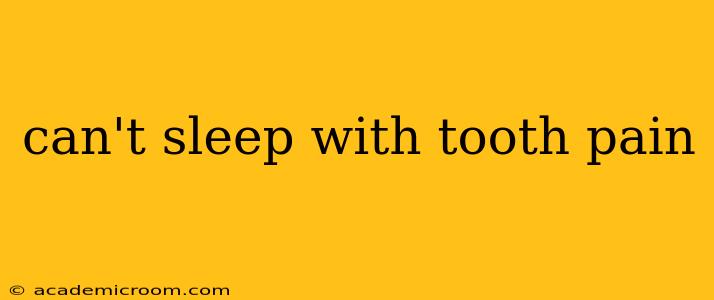Tooth pain is a nightmare, literally. That throbbing ache can make sleep impossible, leaving you exhausted and irritable. But don't despair! This comprehensive guide offers effective strategies to manage your toothache and finally get some much-needed rest. We'll explore various home remedies, over-the-counter solutions, and when to seek professional dental care.
What Causes Toothache Pain That Prevents Sleep?
Several factors can contribute to severe tooth pain that disrupts sleep. These include:
- Cavities: Decayed tooth enamel exposes the sensitive dentin, leading to sharp, shooting pains.
- Abscesses: A pus-filled infection at the root of the tooth can cause intense throbbing pain that radiates throughout the jaw.
- Gum disease (gingivitis or periodontitis): Inflammation and infection of the gums can lead to discomfort and pain.
- Cracked or chipped teeth: Exposure of the tooth's inner layers can trigger pain, especially when chewing or applying pressure.
- Teeth grinding (bruxism): This can wear down enamel, leading to sensitivity and pain.
- Sinus infection: Pressure from a sinus infection can sometimes be felt as tooth pain, particularly in the upper teeth.
- Wisdom teeth: Impacted or erupting wisdom teeth can cause significant discomfort.
Home Remedies for Toothache Pain Relief Before Bed
Before resorting to medication, several home remedies can provide temporary relief:
- Saltwater rinse: Dissolve ½ to ¾ teaspoon of salt in a glass of warm water. Gently swish the solution around your mouth for 30-60 seconds, then spit it out. The salt water can help cleanse the area and reduce inflammation.
- Cold compress: Apply a cold compress or ice pack wrapped in a thin cloth to your cheek near the affected tooth for 15-20 minutes at a time. This can help numb the area and reduce swelling.
- Over-the-counter pain relievers: Ibuprofen (Advil, Motrin) or naproxen (Aleve) can help reduce pain and inflammation. Always follow the dosage instructions on the label. Acetaminophen (Tylenol) can help manage pain but doesn't address inflammation.
- Clove oil: Clove oil contains eugenol, a natural anesthetic. Apply a small amount directly to the affected tooth using a cotton swab. Use caution, as it can irritate the gums if overused.
- Elevation: Elevating your head with an extra pillow can help reduce swelling and pressure on the affected tooth.
Over-the-Counter Medications for Toothache Pain Relief
If home remedies aren't enough, over-the-counter pain relievers like ibuprofen or naproxen can be more effective for pain and inflammation. However, remember to follow the dosage instructions carefully and consult a doctor if you have any concerns or pre-existing conditions.
When to See a Dentist for Tooth Pain
While home remedies and over-the-counter medications can provide temporary relief, it's crucial to see a dentist if your toothache persists or worsens. Severe tooth pain could indicate a serious underlying problem requiring professional treatment. Don't delay seeking dental care if you experience:
- Intense, throbbing pain that doesn't respond to over-the-counter medication
- Swelling in your face or jaw
- Fever
- Difficulty opening your mouth
- Persistent bad breath
Can a Tooth Infection Keep You Up All Night?
Yes, a tooth infection (abscess) can cause significant pain and discomfort that makes sleeping nearly impossible. The throbbing pain often intensifies at night, as blood flow increases while lying down. A dental abscess requires immediate professional attention to prevent serious complications.
How Long Does Tooth Pain Last?
The duration of tooth pain varies depending on the underlying cause and the treatment received. Minor toothaches from sensitivity may resolve within a few days with home remedies. However, more serious conditions like abscesses require professional treatment and may take longer to heal.
What Home Remedies Can Help With Tooth Pain?
Several home remedies, as mentioned above, can provide temporary relief from tooth pain. These include saltwater rinses, cold compresses, over-the-counter pain relievers, clove oil, and elevation of the head. However, these are temporary solutions, and professional dental care is usually necessary for lasting relief.
Conclusion: Getting the Rest You Deserve
Dealing with tooth pain is incredibly frustrating, especially when it prevents you from getting a good night's sleep. By understanding the potential causes, utilizing effective home remedies and over-the-counter options, and knowing when to seek professional dental care, you can regain control and achieve restful sleep. Remember, early intervention is key to preventing more serious complications and ensuring your overall oral health.
